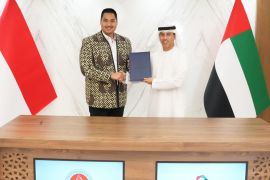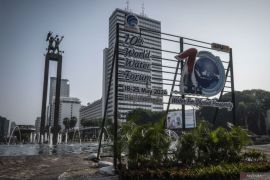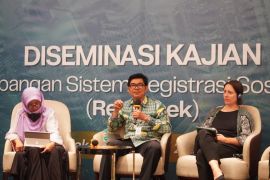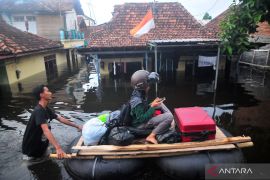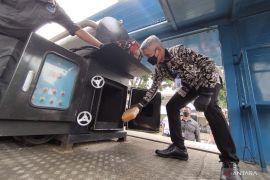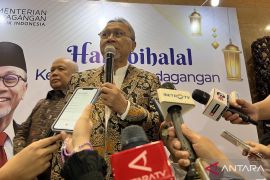PT Ford Motor Indonesia said last January that it planned to stop its operations in the country before the end of this year. This followed the closure of Proton of Malaysia and General Motors.
However, Ipsos Business Consulting company still sees bright future prospects. It said Indonesia still has the opportunity to become an automotive production hub for the ASEAN region and gradually replace Thailand as a car production base.
"This is evident from the output trend in vehicle production, policies, and infrastructure, which continue to undergo improvements followed an increase in production capacity, domestic consumption and export volumes," Marcus Scherer, head of the Global Automotive Sector of Ipsos Business Consulting, stated on Wednesday.
Industry Minister Saleh Husin shared the same optimism. He said last month that the Indonesian automotive industry is increasingly witnessing good growth as evident in the increasing investment by automotive factories.
"The automotive industrys growth is good. Toyota, for example, has invested some Rp20 trillion for its automotive development from 2015 to 2019," noted the minister.
Toyota had spent Rp5 trillion in 2015 and would invest Rp5.4 trillion in 2016, he said.
Based on the industry ministrys data, Toyota controls about 31 to 32 percent of the automotive market in Indonesia. By 2014, it had invested Rp40 trillion in Indonesia and plans to complete the construction of its machine factory in Karawang, West Java during 2015 - 2019 period.
The minister appreciated other automotive industries serious about investing in Indonesia by opening new factories, either for assembling or manufacturing spare parts.
"Mitsubishi has built a new factory worth Rp3.5 trillion and Wuling of China has invested Rp11 trillion," Saleh Husin remarked.
Marcus Scherer of the Ipsos said Indonesian policy makers and stakeholders as well as automotive producers should consider various aspects that have a major impact on the supplies of automotive spare parts in the future.
So far, Thailand has been the largest automotive producer in Southeast Asia, with an annual production of some two million cars as compared to Indonesia, which produced only about 1.1 million units in 2015.
Indonesia has not yet been able to come at par with Thailand in developing its export market. It exported only about 23 percent of its domestic production in 2015, while Thailand was able to export 55 percent of its domestic production.
As regards the ministry of industry, Minister Saleh Husin said it has coordinated with relevant ministries to maintain the investment climate in Indonesia. If that happens, investors would not shift to neighboring countries, he acknowledged.
"If Vietnam offers incentives, the investors will indeed move to that country. So, we have to compete. In short, we are coordinating with other ministries to create convenient and conducive investment climate," he said.
With regard to Thailand, there has been a high production gap, amounting to some 810 thousand units in 2015, but by 2020, the gap is expected to narrow down to 464 thousand units only.
In order to replace Thailand as the top car production center in the ASEAN, Indonesia should be able to overcome the production gap through a combination of solutions, Marcus stressed.
It needs to enhance the production capacity. In 2015, Indonesia had a production capacity of two million units, of which only 62 percent was utilized.
Therefore, Indonesia should increase its follow-up investment to nearly US$2.6 billion for constructing new factories or for increasing the production capacity of the existing factories based on the assumption that utilization would remain unchanged.
Chukiat Wongtaveerat, a senior consultant manager at Ipsos Bangkok, opined that Thailand has been able to safeguard its automotive industries.
Wongtaveerat noted that several leading automotive producers had announced strategic steps to pull out of the Indonesian market, particularly the Ford Motor Company and General Motors.
He remarked that other leading players, such as Volkswagen, Hyundai, and Mazda, were not yet able to communicate their clear strategies to safeguard their strong and profitable market shares in the two countries, particularly in Indonesia, which needed consistent regulations and sustainable and supporting automotive infrastructure development in the face of the current downward sales trend.
According to Franky Sibarani, the chief of the Capital Investment Coordinating Board (BKPM), Fords decision to stop operations in Indonesia did not indicate any decline in investment interest in the countrys automotive industry.
Such a decision would have no impact on investment in the sector in Indonesia, Franky Sibarani said.
"Interest is still strong among those wishing to venture into the automotive industry in the country," he added.
Ford has operated only as a car importer, offering after sales service, maintenance and repair, he said. "It has no license in the automotive industry," he added.
Based on data at BKPM, total investment in the country in the industry producing transport equipment, including automotive industry, was valued at Rp23.57 trillion in 2015, up 6.5 percent from the previous year.
Foreign investments in the automotive sector, both in manufacturing and services (trade and repairs), were valued at Rp21.6 trillion in 2015, up 13 percent from the year before.
With a sound investment climate, Indonesia--which hosts the largest chunk of the ASEAN population of 600 million-- can become an automotive production hub in the region.
After all, according to Marcus Schere, the current conditions in Indonesia are showing a positive trend, as reflected in the easing of regulations on foreign ownership through its revised negative investment list and simplified licensing procedures.(*)
Reporter: Andi Abdussalam
Editor: Heru Purwanto
Copyright © ANTARA 2016
